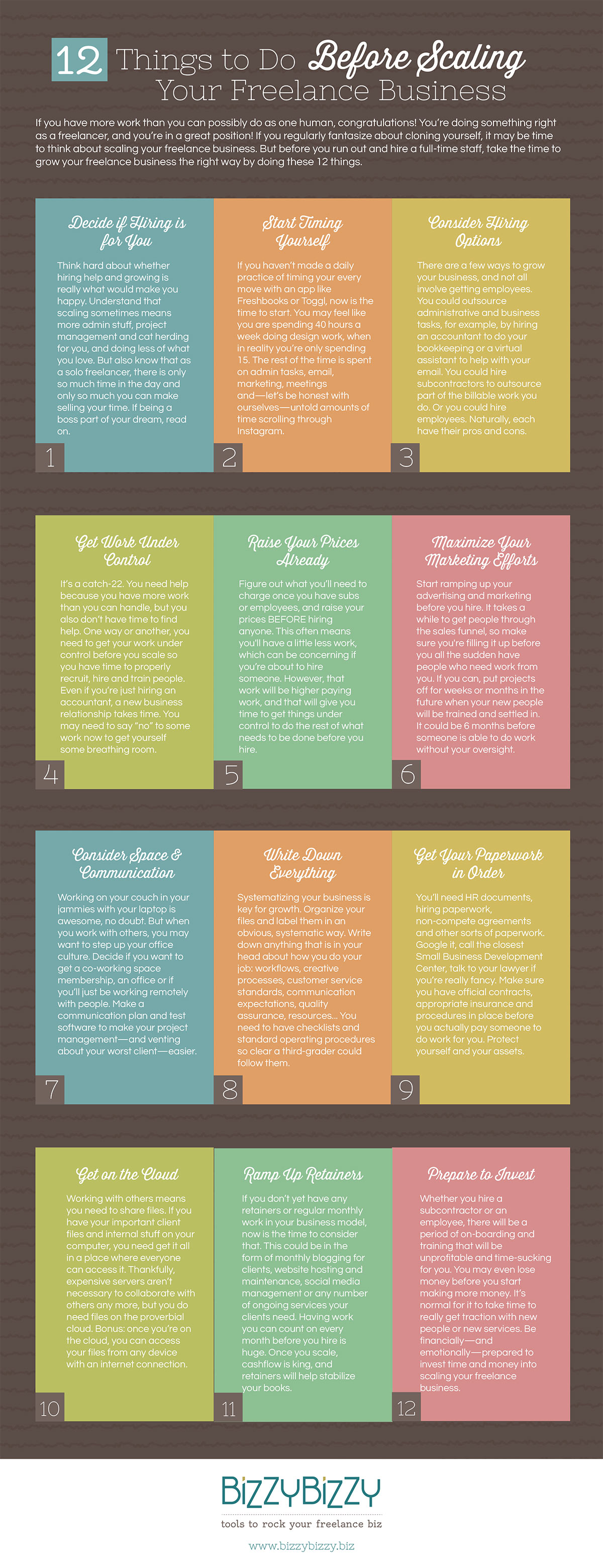Prepare to Grow: 12 Things to Do Before Scaling Your Freelance Business

How do you know when it’s time to hire and scale your freelance business?
Well for starters, if you have more work than you can possibly do as one human, congratulations! You’re doing something right, and you’re in a great position for growth! If you regularly fantasize about cloning yourself, it may be time to think about scaling your freelance business.
Scaling your business can mean a lot of things. In our 16 business models for freelancers, you’ll see some ways to scale involve hiring, some involve outsourcing and some are just you at your computer doing your thing and making more money. All of the models have their pros and cons and take different skill sets and investments.
If you have more work than you can possibly do as one human, congratulations! You’re doing something right as a freelancer, and you’re in a great position! If you regularly fantasize about cloning yourself, it may be time to think about scaling your freelance business. But before you run out and hire a full-time staff, take the time to grow your freelance business the right way by doing these 12 things.
1. Decide if Hiring is for You
Think hard about whether hiring help and growing is really what would make you happy. Understand that scaling sometimes means more admin stuff, project management and cat herding for you, and doing less of what you love. But also know that as a solo freelancer, there is only so much time in the day and only so much you can make selling your time. If being a boss part of your dream, read on.
2. Time Yourself
If you haven’t made a daily practice of timing your every move with an app like Freshbooks or Toggl, now is the time to start. You may feel like you are spending 40 hours a week doing design work, when in reality you’re only spending 15. The rest of the time is spent on admin tasks, email, marketing, business development, meetings, research and—let’s be honest—wasting time on social meeds.
3. Consider Hiring Options
If you’re drowning in work, there are a few ways to grow your business, and not all involve getting employees. You could outsource administrative and business tasks. For example, hiring an accountant to do your bookkeeping or a virtual assistant to help with your email. You could hire subcontractors to outsource part of the billable work you do. Or you could hire employees. Naturally, each have their pros and cons.
4. Get Under Control
It’s a catch-22. You need help because you have more work than you can handle, but you also don’t have time to find help. One way or another, you need to get your work under control before you scale so you have time to properly recruit, hire and train people. Even if you’re just hiring an accountant, a new business relationship takes time. You may need to say “no” to some work that is coming in to get yourself some breathing room.
5. Raise Your Prices
Figure out what you’ll need to charge once you have subs or employees, and raise your prices BEFORE hiring anyone. This often means you’ll have a little less work, which can be concerning if you’re about to hire someone. However, that work will be higher paying work, and that will give you time to get things under control to do the rest of what needs to be done before you hire.
6. Maximize Your Marketing Efforts
Start ramping up your advertising and marketing before you hire. It takes a while to get people through the sales funnel, so make sure you’re filling it up before you all the sudden have people who need work from you. If you can, put projects off for weeks or months in the future when your new people will be trained and settled in.
7. Determine How to Collaborate
Sitting on your couch in your jammies with your laptop is great! But when you work with others, you may want to step up your office culture. Figure out if you need to get a co-working space membership, an office or if you’ll just be working remotely with people. Make a plan for how you will communicate every day and what software you can use to make your project management (and life) easier.
8. Write Down Everything
Systematizing your business is key for growth. Organize your files and label them in an obvious, systematic way. Write down anything that is in your head about how you operate or do your work: workflows, policies, creative processes, customer service standards, communication expectations, quality assurance, resource… You need to have checklists and standard operating procedures so clear a third-grader could follow them.
9. Get Your Paperwork in Order
You’ll need HR documents, hiring paperwork, non-compete agreements, privacy clauses and other sorts of paperwork. Google it, call the closest Small Business Development Center, talk to your lawyer if you’re really fancy. Make sure you have official contracts, appropriate insurance and procedures in place before you actually pay someone to do work for you. The bigger you get, the more is at stake and the more you need to protect yourself and your assets.
10. Get on the Cloud
Working with others means you need to share files. If you have all your important client files and internal stuff on your computer, you need to invest some time in organizing it all and getting it all online. Thankfully, expensive servers aren’t necessary to collaborate with others any more, but you do need files on the proverbial cloud. Some popular options are Google Drive, One Drive or DropBox. Bonus: once you’re on the cloud, you can access your files from device with an internet connection.
11. Ramp Up Retainers
If you don’t yet have any retainers or regularly occurring monthly work in your business model, now is the time to get in on that. This could be in the form of monthly blogging, website hosting and maintenance, social media management or any number of ongoing services your clients need. Having work you can count on every month before you hire help is huge. Once you scale, volume is key.
12. Prepare to Invest
Whether you hire a subcontractor or an employee, there will be a period of on-boarding and training that will be—frustratingly—unprofitable and time-sucking for you. You may even lose money before you start making more money. It’s normal for it to take someone six months to really get traction at a new place, so be financially and mentally prepared to invest time and money into scaling your freelance business.




Leave a Reply
Want to join the discussion?Feel free to contribute!